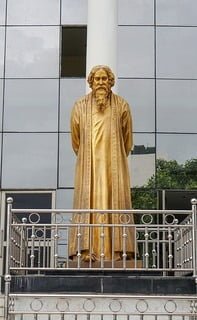A paragraph is a short collection of well-organized sentences which revolve around a single theme and is coherent. A good paragraph expresses everything it has to say briefly.
In this post, we present you with a brilliant paragraph on Rabindranath Tagore.

Paragraph on Rabindranath Tagore (100 Words)
Rabindranath Tagore, regarded as India’s greatest poet and one of the world’s finest, was born into a cultured and affluent family in Kolkata on 7 May 1861. Rabindranath did not enjoy formal schooling and was mostly homeschooled. A versatile literary genius, Rabindranath Tagore’s contributions spanned various genres, including poetry, songs, novels, stories, essays, and letters of immense literary value. He won the Nobel Prize in Literature in 1913 for his work ‘Geetanjali,’ and his impact on Bengali literature is immeasurable. He relinquished his knighthood in protest of the Jalianwalah Bagh massacre. His death on 7 August 1941, created a vacuum in the world of literature.
Also, Read Paragraph on Netaji Subhas Chandra Bose
Paragraph on Rabindranath Tagore (150 Words)
Rabindranath Tagore, regarded as India’s greatest poet and one of the world’s finest, was born into a cultured and affluent family in Kolkata on 7 May 1861. His father, Devendranath Tagore, and mother, Sarada Devi, provided him with a rich upbringing, while his grandfather, Dwarakanath Tagore, was among the wealthiest people in the city. Rabindranath did not enjoy formal schooling and was mostly homeschooled.
A versatile literary genius, Rabindranath Tagore’s contributions spanned various genres, including poetry, songs, novels, stories, essays, and letters of immense literary value. He won the Nobel Prize in Literature in 1913 for his work ‘Geetanjali,’ and his impact on Bengali literature is immeasurable.
Daily Test - Attempt Now
In addition to his literary pursuits, Rabindranath Tagore was a fervent patriot and played an active role in the movement against the Partition of Bengal in 1905. He relinquished his knighthood in protest of the Jalianwalah Bagh massacre, demonstrating his unwavering commitment to India’s freedom struggle. His death on 7 August 1941, created a vacuum in the world of literature.
Also, Read Paragraph on Swami Vivekananda
Paragraph on Rabindranath Tagore (200 Words)
Rabindranath Tagore, regarded as India’s greatest poet and one of the world’s finest, was born into a cultured and affluent family in Kolkata on 7 May 1861. His father, Devendranath Tagore, and mother, Sarada Devi, provided him with a rich upbringing, while his grandfather, Dwarakanath Tagore, was among the wealthiest people in the city. Rabindranath did not enjoy formal schooling and was mostly homeschooled.
A versatile literary genius, Rabindranath Tagore’s contributions spanned various genres, including poetry, songs, novels, stories, essays, and letters of immense literary value. He won the Nobel Prize in Literature in 1913 for his work ‘Geetanjali,’ and his impact on Bengali literature is immeasurable. Disenchanted with the conventional educational system, he founded the institution of Santiniketan, Visva Bharati in Bolpur, which was geared towards more holistic education.
In addition to his literary pursuits, Rabindranath Tagore was a fervent patriot and played an active role in the movement against the Partition of Bengal in 1905. He relinquished his knighthood in protest of the Jalianwalah Bagh massacre, demonstrating his unwavering commitment to India’s freedom struggle. His demise on 7 August 1941, left a profound void in the world of literature, and his legacy continues to inspire generations of readers and writers.
Also, Read Paragraph on APJ Abdul Kalam
Paragraph on Rabindranath Tagore (250 Words)
Rabindranath Tagore, regarded as India’s greatest poet and one of the world’s finest, was born into a cultured and affluent family in Kolkata on 7 May 1861. His father, Devendranath Tagore, and mother, Sarada Devi, provided him with a rich upbringing, while his grandfather, Dwarakanath Tagore, was among the wealthiest people in the city. Rabindranath did not enjoy formal schooling and was mostly homeschooled. As a child, he delved into the epics of the Mahabharata and the Ramayana, and his poetic journey began at an early age with his first composition.
A versatile literary genius, Rabindranath Tagore’s contributions spanned various genres, including poetry, songs, novels, stories, essays, and letters of immense literary value. He won the Nobel Prize in Literature in 1913 for his work ‘Geetanjali,’ and his impact on Bengali literature is immeasurable. Disenchanted with the conventional educational system, he founded the institution of Santiniketan, Visva Bharati in Bolpur, which was geared towards more holistic education. Our national song, “Jana-Gana-Mana- Adhinayaka” comes from his pen.
In addition to his literary pursuits, Rabindranath Tagore was a fervent patriot and played an active role in the movement against the Partition of Bengal in 1905. He relinquished his knighthood in protest of the Jalianwalah Bagh massacre, demonstrating his unwavering commitment to India’s freedom struggle. His demise on 7 August 1941, left a profound void in the world of literature, and his legacy continues to inspire generations of readers and writers. His death created a vacuum in the world of literature.
You Asked, We Listened – Get Free Access to All Writing Lists 😍😍
Also, Read

Descriptive Paragraph on a Person

Paragraph on Mahatma Gandhi

